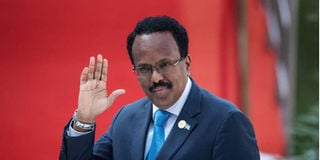Premium
Somali leaders strike elections deal

Somalia's President Mohamed Abdullahi Farmaajo.
What you need to know:
- Jubbaland and Puntland State leaders stayed way from the meeting in Dhusamareb, the capital of Galmudug state.
- The deal arose from nearly two months of uncertainty.
- It also means that Somalia will not have direct elections as earlier thought.
Somalia's political leaders have finally agreed on a poll model that involves electoral caucuses.
As part of the agreement, each Caucus of 303 delegates will elect an MP who will get a seat in parliament.
Each federal state will have at least three caucuses which will elect MPs for the Lower House.
These MPs will in turn elect a President.
The delegates will be nominated jointly by national and federal state electoral bodies.
The deal arose from nearly two months of uncertainty. It also means that Somalia will not have direct elections as earlier thought.
The deal still has to be approved by the Lower House (House of the People) of Parliament.
Leaders from Hirshabelle (Mohamed Abdi Waare), Galmudug (Ahmed Abdi Karie) and South West (Abdiaziz Hassan Laftagareen) signed the document alongside Somali President Mohamed Abdullahi Farmaajo.
The Mayor of Benadir region which covers Mogadishu metropolis, Omar Mohamud Mohamed ‘Filish’, also endorsed the agreement.
Puntland and Jubbaland leaders, Said Abdullahi Deni and Ahmed Madobe, were not part of the deal that was reached in Dhusamareb, the capital of Galmudug state.
“Tonight in Dhusamareb, I have reached an agreement on elections, with federal member states and Benadir region which I hope will lead the country to a fair and timely election. I extend a brotherly hand of invitation to those who are yet to join us,” Somali President Farmaajo said on Thursday night.
Somaliland
The seats of the legislators from breakaway Somaliland will be held in an indirect voting, known as Doorasho dadban. (That means the voting will not be held in their regional constituencies but will be held in assigned area such as in the capital Mogadishu).
Promoters of Somaliland, who declared their zone independent from the rest of Somalia in 1991, have always insisted that they have nothing to do with the Mogadishu-based government of Somalia.
But Somalia insists that Somaliland is part and parcel of its jurisdiction and must have its representation in the federal parliament.






